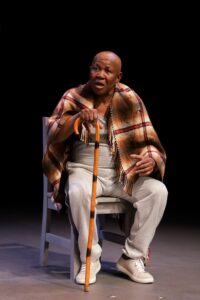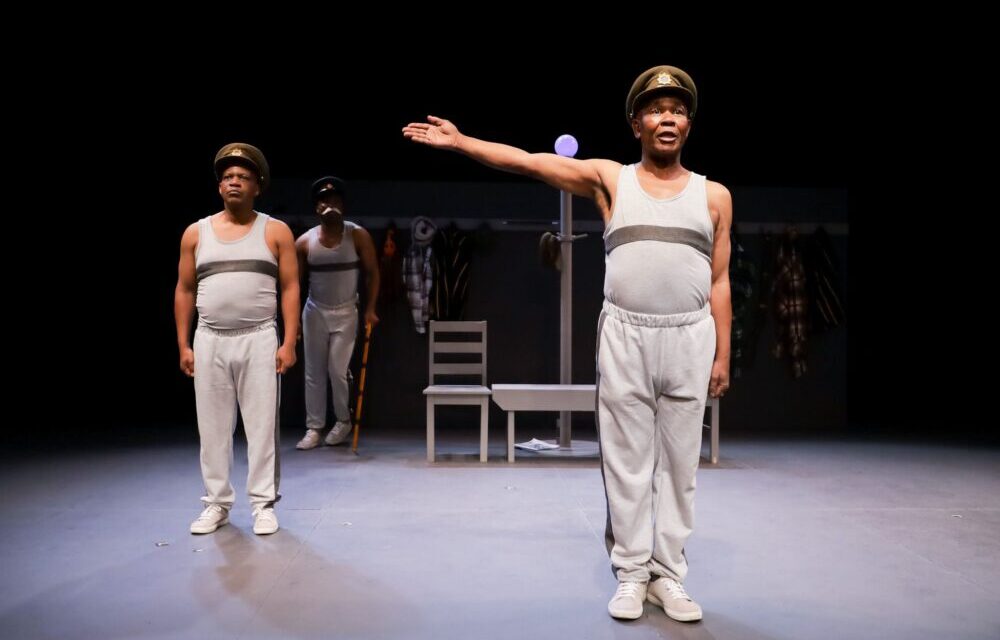Percy Mtwa, the legendary playwright and director of multiple award-winning theatre productions, such as the classic Woza Albert (with Mbongeni Ngema and Barney Simon), was never meant to star in the State Theatre’s current production of his iconic Bopha!. Had he had it his way, he would have been sitting comfortably in the director’s chair, something he has done since the production’s premiere in September 1986 at the Market Theatre. This time, though, it seems the theatre gods had other ideas, as one of the actors who had been cast in the production unfortunately fell in just before the show was set to begin its run. True to theatre’s “the show must go on” mantra, up stepped Percy Mtwa in the key role of Mjandini. And, just as a duck takes to water, it was as if that is how it has always been meant to be.

The legendary Percy Mtwa stepped in the key role of Mjandini (Photos by Mpilo Zondi).
There is no doubt that Percy Mtwa is a national treasure, and, with such a glorious career primarily as a playwright and director, perhaps the one feather which had been missing (or forgotten) from his glittering hat is that of actor. And so, it was those who have watched this iteration of Bopha! who were all but mesmerized by the sheer talent of this legend as he took not only took the role on short notice and made it his own – the production became a demonstration of what a cross-generational production could look like, even if it was not by design.
It is hard to believe that the last time Percy Mtwa staged this production was in 1987 at the Los Angeles International Theatre Festival, where, fittingly, the play won five Drama Critic Circle Awards for Best Play, Best Director, and Best Actor for each of the three actors. The production has gone on to be staged numerous times over the years, with a major highlight being the 1993 American film version, marking Morgan Freeman’s directorial debut and had Danny Glover as the lead.
Bopha! was, according to Percy Mtwa, conceived in 1984, due to, among other things, the rampant black-on-black violence which was plaguing the townships, and also partly inspired by his own father’s experiences as a policeman in the 1950s, but who later got expelled for insubordination as he refused to enforce the draconian laws on his fellow black countrymen.
Though Apartheid may have ended, Bopha! is as relevant now as it was then, because policing, especially when it comes to black bodies, has not changed, as evidenced by things such as the Marikana massacre, and as one watches the production, the characters are torn between enforcing unjust laws and resisting something which becomes a key conflict between the characters in the production.

Bopha! featured Percy Mtwa, Tshallo Chokwe and Terrence Ngwila (Photos by Mpilo Zondi).
After its Market Theatre premiere, Bopha! went on an international tour, which included Swaziland, England, Scotland, Australia, and the United States of America, and thirty years later its staging at the State Theatre has been met with rave reviews testament to the proud and firebrand protest theatre tradition, which productions such as this belong to.
If there was or if there is to be a South African Theatre Hall of Fame, then there would be little argument to inducting Bopha! and many other protest theatre productions which defied Apartheid laws, and did their bit to galvanize and inspire a generation to not only dream of freedom, but do all in their power for the South Africa to finally be liberated.
Bopha! was written and directed by Percy Mtwa and featured Bheki Mkhwane (replaced by Percy Mtwa), Tshallo Chokwe and Terrence Ngwila. It is on at the State Theatre in Pretoria from 25 May – 13 June 2021.
This article was originally posted on The African Theatre Magazine on June 12, 2021, and has been reposted with permission. To read the original article, click here.
This post was written by the author in their personal capacity.The opinions expressed in this article are the author’s own and do not reflect the view of The Theatre Times, their staff or collaborators.
This post was written by Tonderai Chiyindiko.
The views expressed here belong to the author and do not necessarily reflect our views and opinions.


















